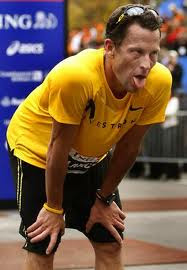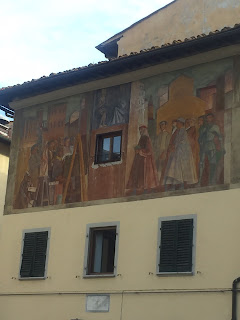What you have to respect about Lance

So the guy won the Tour de France seven times. And he beat testicular cancer. I’m impressed. But now he’s really got my attention. Lance Armstrong is back as a professional triathlete, a sport where he first set the world on fire as a 16-year-old. Not content to sit back and eat himself into a food coma after he won his record-setting seventh Tour de France in 2005 (which would be quite a temptation after years of watching your weight down to the ounce), Lance went and ran the New York Marathon. The year after, dissatisfied with his finishing time, he went back and ran it ten minutes faster. After that he decided he’d go back and do the Tour de France again, which committed him to a couple of years of prep, pro racing and, of course, the tour. He got third place in 2009, an enormous accomplishment in his late 30’s among nearly 200 of the best riders in the world. The following year, though, the odds caught up to him and all the crashes he miraculously missed during those seven TdF wins happened to him in one season and he retired from pro cycling after the 2010 tour.
Wouldn’t it make sense for him to just hang it up, relax, oversee Livestrong and be a chilled out 40-something-year-old? No, not Lance. He’s back in triathlon and he’s doing it to win. In February he did an Ironman 70.3 (that’s what we used to call a Half-Ironman before the license to the word “Ironman” was sold to corporate interests) in Panama, and last weekend he did the Ironman 70.3 in Galveston, finishing seventh. Think of the risks he’s incurring: not the risk of crashing or serious physical injury, but the risk of ridicule. Here he is a seven-time Tour de France champion – win the Tour once or even win a single stage and you’re a made man in Europe – but he’s slugging it out with the world’s best triathletes. I heard him in an interview say he was worried about getting so fatigued on the run that he’d have to walk. For a guy like Lance, that would have to be a very real concern. Imagine the photos that would be taken and broadcast around the world with captions like, “seven time Tour de France champion humbled at local triathlon.” You could imagine the French getting a real charge at that.
So why would Lance, now 40 years old with five kids, take the risk to race against a bunch of younger guys knowing the odds are increasingly against him? On one level it’s for the good of his cancer foundation, Livestrong. He knows his organization and his campaign are much more compelling with him as an athlete than as a former athlete. But I have to believe that for him personally he knows that to stop training hard and competing is to let something die inside him. And when you’ve been as close to death as he has been you won’t let any part of yourself die without a fight.
I read an interview with someone who had climbed Mount Everest who said that, contrary to popular opinion, you’re not at your best when you’re standing on the summit of the mountain. You take a picture, you grin and shake hands with whoever else made it up there with you, but you’re already starting to die at that altitude. You can’t stay there and you still have the hazardous descent ahead of you. No, you’re at your best when you’re still climbing, muscles and lungs straining against the slope and the thin air. That’s when you’re actually doing something truly remarkable and noble.
So keep climbing, Lance. We climb with you.


